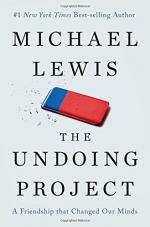
|
| Name: _________________________ | Period: ___________________ |
This test consists of 5 multiple choice questions, 5 short answer questions, and 10 short essay questions.
Multiple Choice Questions
1. Where was Redelmeier accepted as a resident in 1985?
(a) Harvard.
(b) Yale.
(c) Stanford.
(d) Thomas Jefferson University.
2. What was Barbara Tversky doing when the war broke out in Israel in 1973?
(a) She was on the way to the emergency room with her eldest son.
(b) She was cooking in a restaurant.
(c) She was teaching a class.
(d) She was in the U.S. visiting family.
3. What was the prevailing theory of decision-making called when Tversky and Kahneman began researching it?
(a) Loss theory.
(b) Reward theory.
(c) Sense theory.
(d) Utility theory.
4. Where did Redelmeier grow up?
(a) Beijing.
(b) Tokyo.
(c) San Francisco.
(d) Toronto.
5. Who served as the middleman in the negotiations between Israel and Syria in 1974?
(a) Bill Clinton.
(b) Bill Mitchell.
(c) Richard Nixon.
(d) Henry Kissinger.
Short Answer Questions
1. What subject was Kahneman running experiments on in his Berkeley lab by the time he met Redelmeier?
2. What did Redelmeier struggle with as a child?
3. What did Kahneman and Tversky discover about the soldiers' reasons for fighting?
4. Where did Kahneman fly to meet Anne Treisman and declare her love for her in 1975?
5. Once Tversky and Kahneman felt they had exhausted their research into judgment, what topic did they turn to?
Short Essay Questions
1. Why did Kahneman and Tversky move to the United States at the same time in Chapter 10?
2. After the conflict in 1973, what topic did Tversky entice Kahneman to work with him on tackling?
3. In Chapter 9, what did Tversky find when he went to the Suez Canal at the end of the conflict in 1973?
4. In Chapter 7, what mathematical principle did Kahneman find was responsible for pilots' performance after praise or criticism?
5. In Chapter 9, what touched Kahneman about Tversky's advice to him about where to sleep while they were in the area of the fighting in Israel?
6. In Chapter 8, how did Tversky's and Kahneman's work influence Donald Redelmeier?
7. In Chapter 8, what is one reason Redelmeier suspected Tversky seemed to have so much time to work with him on ideas and papers?
8. In Chapter 10, what was Kenneth Arrow's one big question for Tversky when he lectured on decision-making theory?
9. To whom did most economists usually write - Kahneman or Tversky - and why?
10. In Chapter 9, what was one event that made Kahneman lose faith in his and Tversky's research to change minds at a high level?
|
This section contains 765 words (approx. 3 pages at 300 words per page) |

|




